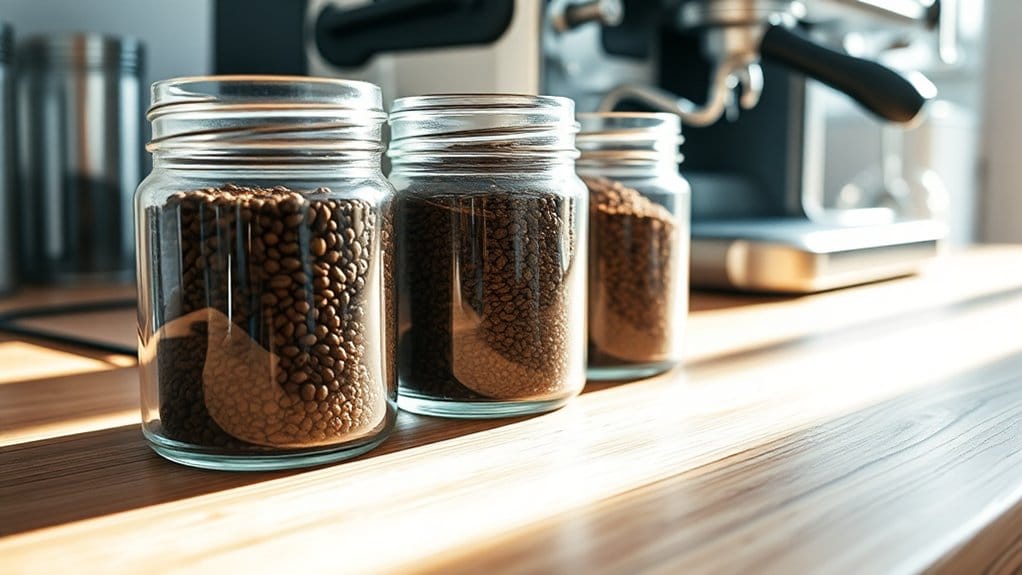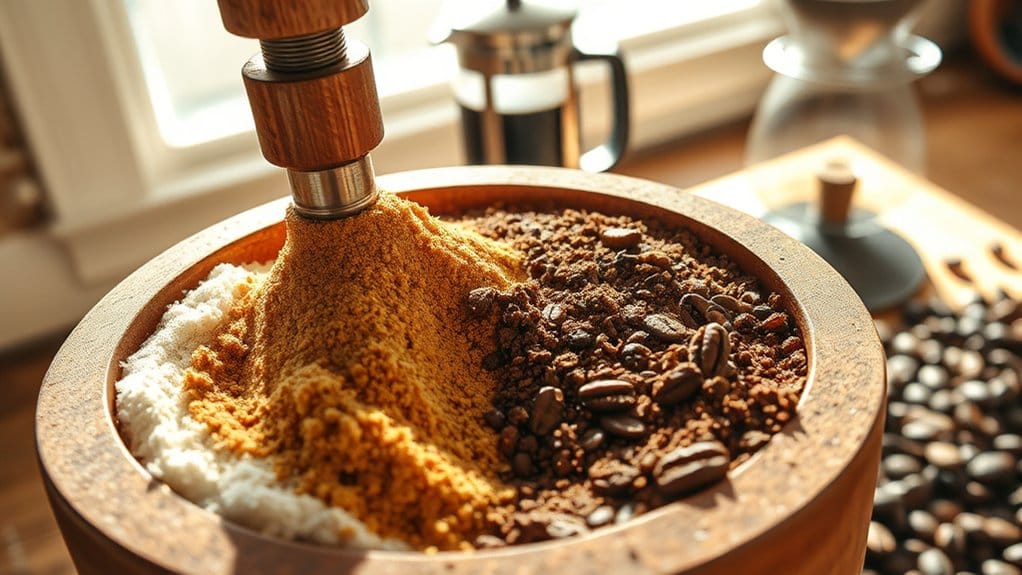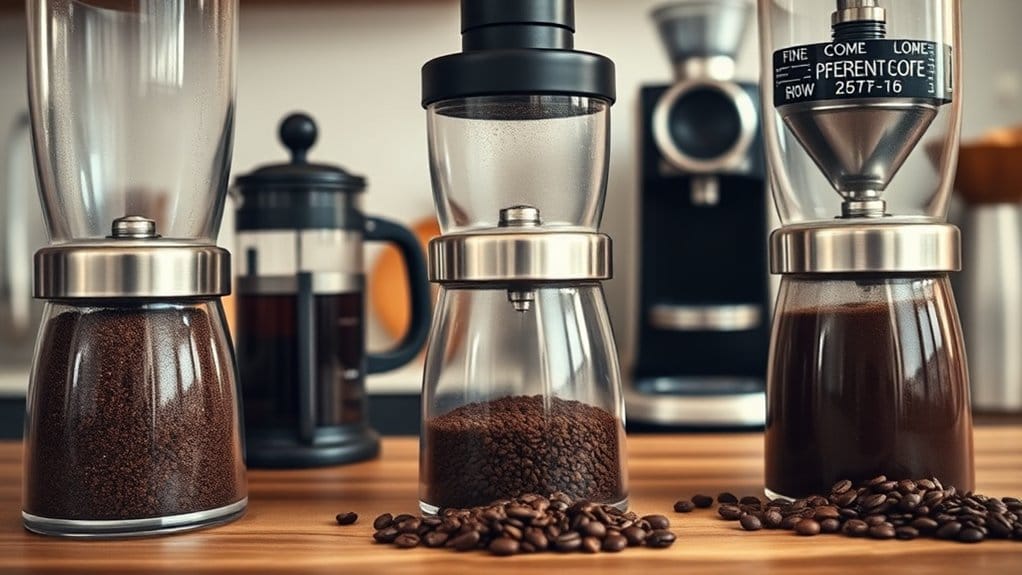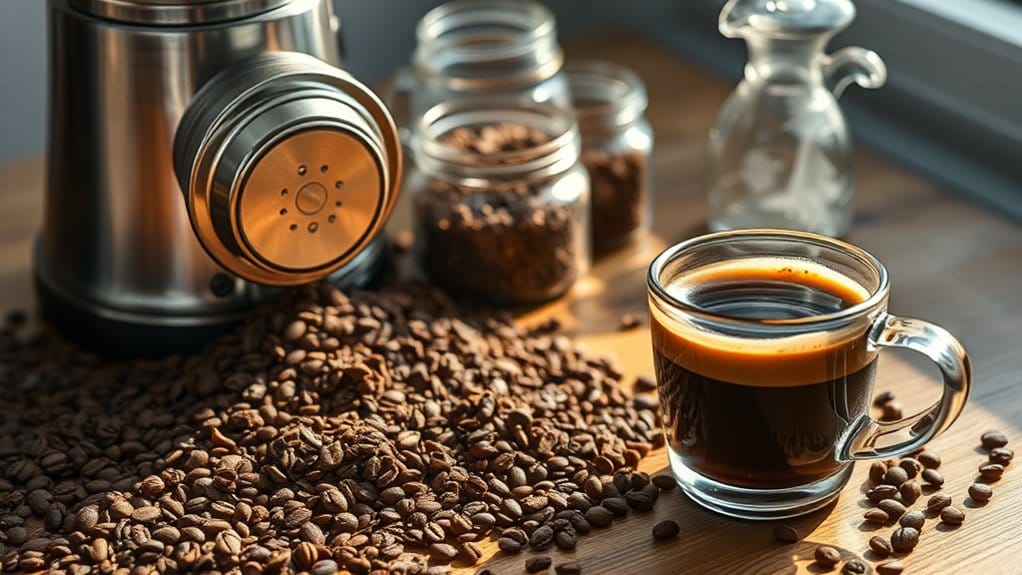Physical Address
304 North Cardinal St.
Dorchester Center, MA 02124
Physical Address
304 North Cardinal St.
Dorchester Center, MA 02124

To brew the best coffee at home, the right grind size matters a lot. For a bold French press, go coarse, like sea salt. If you prefer a smooth pour-over, try a medium-coarse grind. Dark roasts love coarser options too, to avoid bitterness. Light roasts? A finer grind helps bring out those delicate flavors. So, experiment a bit! You’ll be amazed at how little changes can transform your cup. Want to know more about perfecting your brew?

When you’re brewing coffee at home, choosing the right grind size can feel a bit like trying to find the perfect pair of shoes—there’s a fit for every occasion!
For cold brew, you’ll need an extra coarse grind, almost like giant peppercorns. This allows for that long, smooth extraction, avoiding bitterness. Correct grind size is crucial in enhancing coffee flavor and quality, as misalignment can lead to poor taste. A burr grinder can also help you achieve a consistent grind for better flavor extraction. Freshly ground coffee provides superior flavor compared to pre-ground options, which is essential for enjoying a great cup.
If you fancy a French press, go for a coarse grind, like sea salt, ensuring that rich flavor shines without too much sediment.
Pour-over lovers should aim for medium-coarse, striking a balance for that magical flow and extraction.
Siphon coffee? It’s all about the medium grind—fine enough to extract flavor but not too fine to clog your filter.
Happy brewing!
The way you grind your coffee can really change the game, especially when you consider the roast level. Light roasts tend to be denser, so you’ll want a finer grind to bring out those delicate flavors. Think of it like getting the last bit of toothpaste from a tube! Medium roasts, with their balanced density, work well with a medium-fine grind, keeping everything smooth and tasty. But dark roasts? They’re softer and grind easier, needing a coarser grind to avoid that dreaded bitterness. This is because grind size affects extraction, which is essential for achieving the desired flavor profile in your brew. Additionally, proper brewing methods should align with roast profiles to achieve optimal extraction in your coffee preparation. Remember, consistent grind size**** is key to maximizing flavor, so adjust your grind size according to your roast level for a delicious cup that makes you smile. Happy brewing!

Choosing the right equipment can truly improve your coffee game, especially regarding grind size. If you’re using a burr grinder, you’ll enjoy more consistent grinds, making your brews more reliable. Those conical burrs work wonders, reducing stale grounds and keeping things fresh. Burr grinders are known for offering a range of settings from coarse to very fine, which is ideal for different brewing methods. Additionally, using uniform particle size is essential for optimal flavor extraction in your coffee. Conversely, blade grinders chop beans haphazardly, resulting in uneven sizes that can ruin your favorite brew. If you fancy espresso, you’ll need a grinder with fine settings, like the Baratza Virtuoso+. For simpler methods like French press, go for a grinder that offers a broader range of coarseness.
Getting the most out of your coffee isn’t just about the beans you choose; it heavily relies on your grind size, too. Think of grind size like a magic spell, transforming simple coffee into your ideal brew.
Finer grinds, with their larger surface area, extract flavors quickly, which can lead to a bitter potion if overdone. Conversely, coarser grinds take their time and often yield a smoother cup, but watch out for sourness if you go too coarse.
Each brewing method, from espresso to cold brew, has its sweet spot for grind size. Grind size adjustments are crucial in finding the right balance of flavors, so experiment! Uncover what brings out your favorite flavors, and enjoy the nuances every sip has to offer. Coffee adventure awaits!

As you plunge into home brewing, keep in mind that experimentation is a fundamental part of the adventure.
Start by changing just one variable at a time. This manner, you can really pinpoint how each adjustment affects your flavor.
Begin at your last known grind setting, refining your technique instead of playing a guessing game.
Try small steps—like one or two notches—when adjusting grind size. Brew samples close to your baseline for an accurate comparison.
Match your grind with the brewing method; remember, French press needs coarser grinds, whereas espresso calls for fine ones.
The ideal grind size is essential for optimal flavor extraction; your palate is your best guide.
Taste and adjust as you go; your palate is your best guide.
Have fun, and who knows? You might just brew the perfect cup!
Water temperature directly influences grind size and extraction. If you use hotter water, coarser grinds prevent bitterness. Cooler water needs finer grinds to improve flavor extraction, ensuring balanced and enjoyable coffee with every brew.
Yes, grind size definitely impacts caffeine content in brewed coffee. Finer grinds expose more surface area, enhancing extraction. Nonetheless, balance is key; over-extraction can lead to bitterness without greatly increasing caffeine yield.
When brewing coffee, if it tastes bitter or hollow, you’re likely over-extracting. Conversely, if it’s sour or thin, you’re under-extracting. Adjust your grind size and brew time to achieve that perfect balance.
You should adjust your grinder settings whenever you switch brewing methods, change beans, or notice differences in extraction time. Seasonal factors and occasional equipment wear likewise necessitate periodic recalibration for ideal flavor consistency in your coffee.
Yes, pre-ground coffee limits your grind size options, affecting extraction. If it doesn’t match your brewing method, you’ll likely encounter uneven flavors and inconsistent results. Freshly grinding beans allows for better adjustments and ideal brewing.